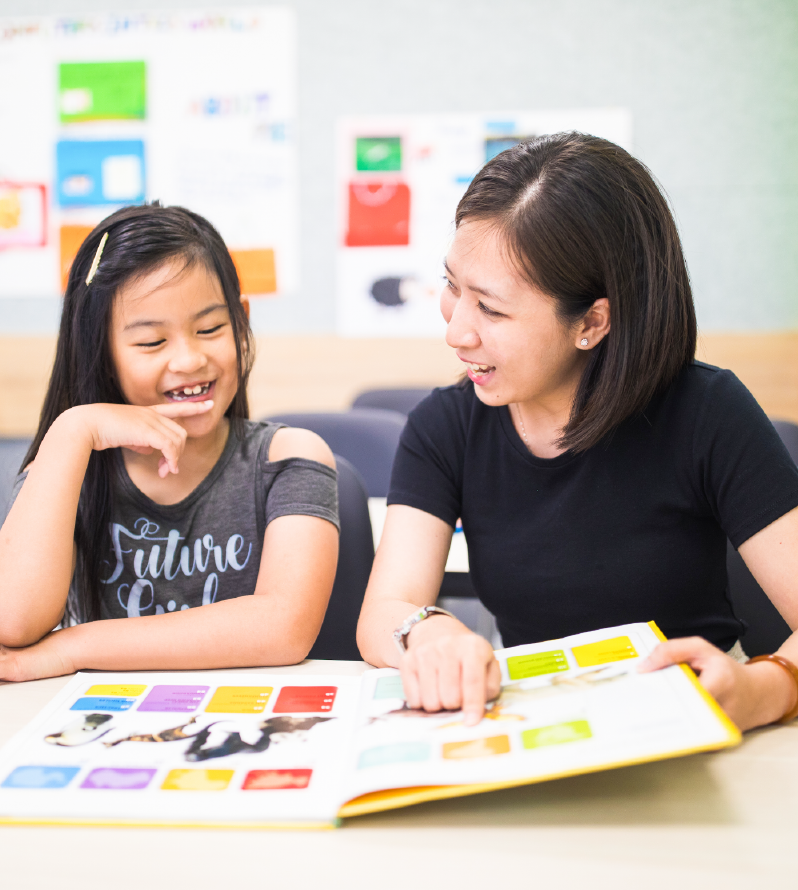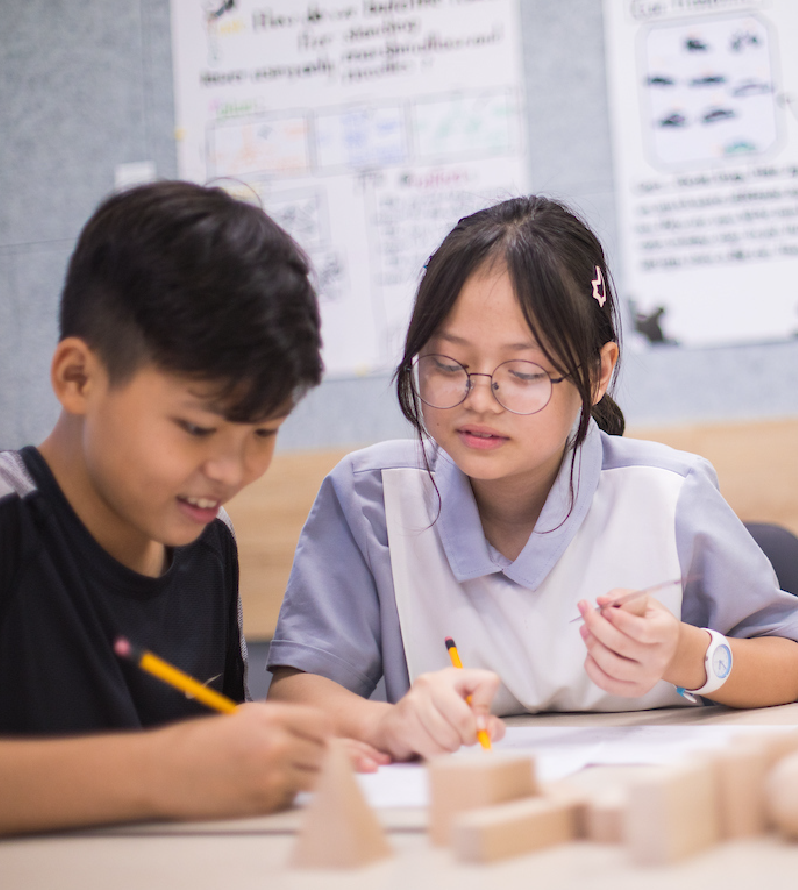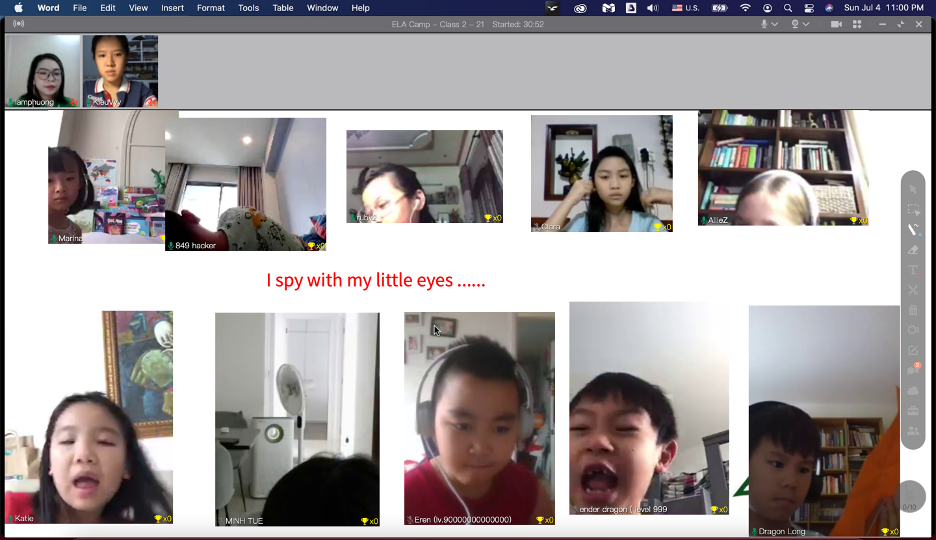The start of a new school year is here. Your child eagerly anticipates returning to international school after a summer break away from friends and teachers. However, after the first day of school, some students may return home with sad faces. Inability to communicate effectively in English leaves them unable to understand conversations among peers and struggling to interact with classmates. This leads to feelings of self-consciousness and isolation on their first day at international schools. A situation no parent wishes for their child.
In reality, this is a common scenario for many students transitioning from public to international schools. Adjusting to an educational environment with different cultural norms can be challenging, leaving students feeling left behind. International schools require students to use English as the primary language for communication, which can be unfamiliar for those coming from public schools. While this transition could hinder communicating with friends at first, if prolonged, it may cause lower self-esteem and discomfort at school due to exclusion from conversations. This could eventually result in demotivation to study and engage effectively in the new school environment.
So, what can parents do to prevent such negative experiences when their children enter an international school? In this article, Everest Education (“E2”) will explore reasons of students’ initial challenges when transitioning to international schools and suggest solutions for families to ensure a positive new educational experience.
1. Why Does Your Child Struggle to Communicate in English?
Before exploring solutions to enhance your child’s integration into an international educational environment, let’s first understand the reasons behind these challenges. The divergence in teaching approaches between public and international schools significantly contributes to the difficulties encountered during this transition. Specifically, these challenges arise from disparities in:
a. Educational programs
In Vietnamese public schools, English often holds the status of a foreign language, with a pronounced emphasis on Reading and Writing skills. Consequently, the English curriculum in most public institutions is structured to build vocabulary and grammar competence, often neglecting opportunities for students to refine their Listening and Speaking abilities. Although this approach might ensure success in school exams, it could limit their capacity to think and utilize English fluently in practical contexts. On the contrary, numerous academic studies advocate for a sequential approach in language development, encompassing Listening – Speaking – Reading – Writing, similar to an infant’s language acquisition journey. Adhering to this sequence is vital for efficient language absorption and proficient English usage.
In contrast, international schools adopt a holistic method of Learning – Speaking – Reading – Writing. Some institutions even offer advanced English Language Arts (ELA) programs. Within these frameworks, students engage with English through narratives, literary works, and intricate texts spanning fields such as Science and Social Studies. This natural immersion enables students to organically foster English skills, creating ample occasions to apply these skills. This procedure cultivates versatile and astute English thinking capabilities.
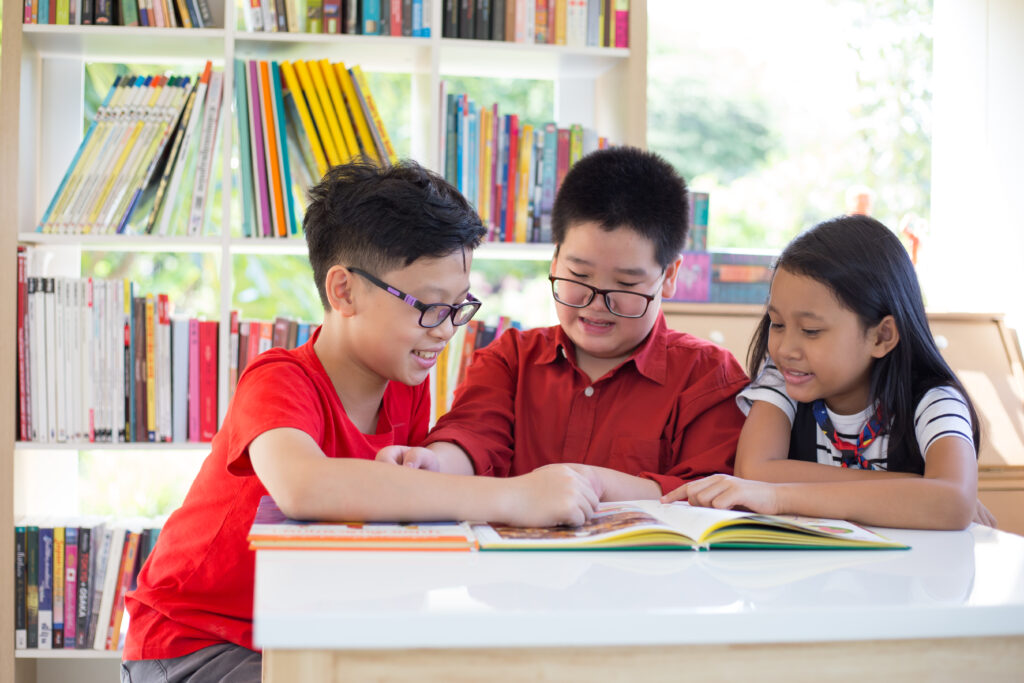
b. Confidence in Language Usage
The limited daily exposure to English language usage in Vietnamese public schools often leads to slow reflexes in communication when conversing in English. The hesitancy to initiate conversations can cause students to feel uncertain about their language skills, consequently restricting their communication efforts. Additionally, the prevalent issue of teachers in public schools not pronouncing words accurately and failing to teach stress patterns in English significantly impacts a child’s confidence in English communication. Students might experience embarrassment due to their non-standard pronunciation or a perceived lack of vocabulary compared to their peers in international schools. Consequently, they may avoid interacting with their peers, feeling like an ‘outsider,’ thus missing valuable opportunities to practice their English communication skills.

2. How to Boost Your Child’s Confidence in International School Communication?
Overcoming the immediate lack of confidence in English communication with peers can be challenging for any child. When facing challenges in integrating into an international school environment, having a supportive companion to gradually enhance English communication skills can expedite the process of conquering the fear of non-inclusion. An ideal companion for your child at this stage is someone highly skilled, capable of guiding them in proper English acquisition, and creating an environment for them to build communication confidence. With these criteria in mind, E2 is confident in being the right companion for your child’s integration into the international environment as we can provide students with:
a. Strong English Proficiency Skills:
With over 12 years of experience in assisting students to excel in international schools, E2’s teaching team offers a personalized learning journey tailored to your child’s abilities and needs, ensuring their most comprehensive English development. Within this personalized journey, your child will learn alongside peers of similar abilities and objectives. As your child consistently practices and hones their English skills, the pressure of English communication diminishes, allowing them to confidently address their communication weaknesses. Additionally, the E2 instructors are readily available to support students beyond classroom hours, assisting with any queries or challenges they may encounter.
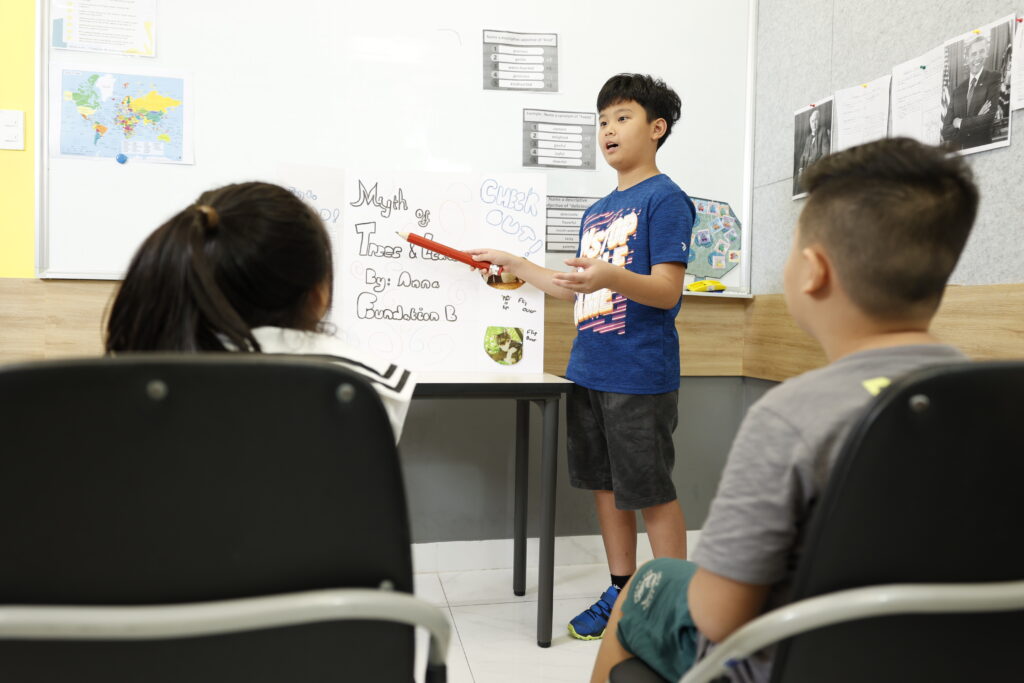
b. English-Friendly Interactive Environment
E2 offers students a small class size (8 – 15 students), ensuring interaction with all classmates and receiving comprehensive attention from the teachers. Moreover, with creative teaching methods like project-based learning – students are provided opportunity to research and apply knowledge in real-world situation, E2 classes provide engaging learning experiences that enable your child to comfortably and confidently communicate in English. We also establish a safe and friendly learning environment, where your child’s story is heard and understood, allowing them to freely share their perspectives.
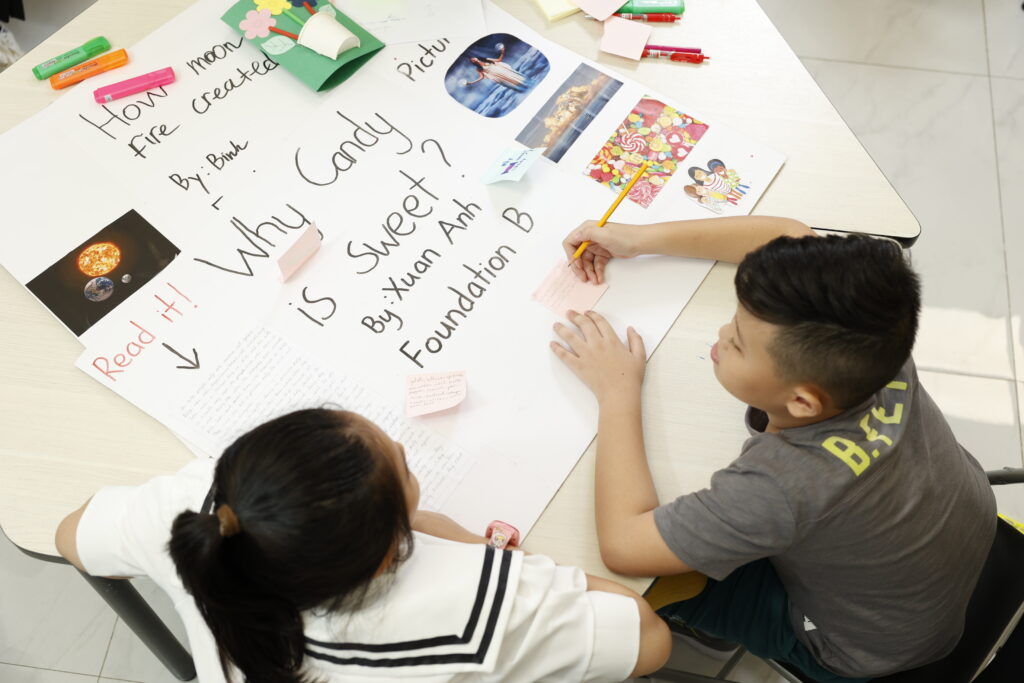
c. Motivation for Loving English
In addition to English classes, E2 also offers extracurricular activities for your child to explore English in various exciting ways. This summer, E2 organized a “POPCORN & BEYOND” movie session for our “climbers”, allowing them to learn unique English vocabulary and enhance their communication skills through fun activities with friends, such as acting, scriptwriting, and more.
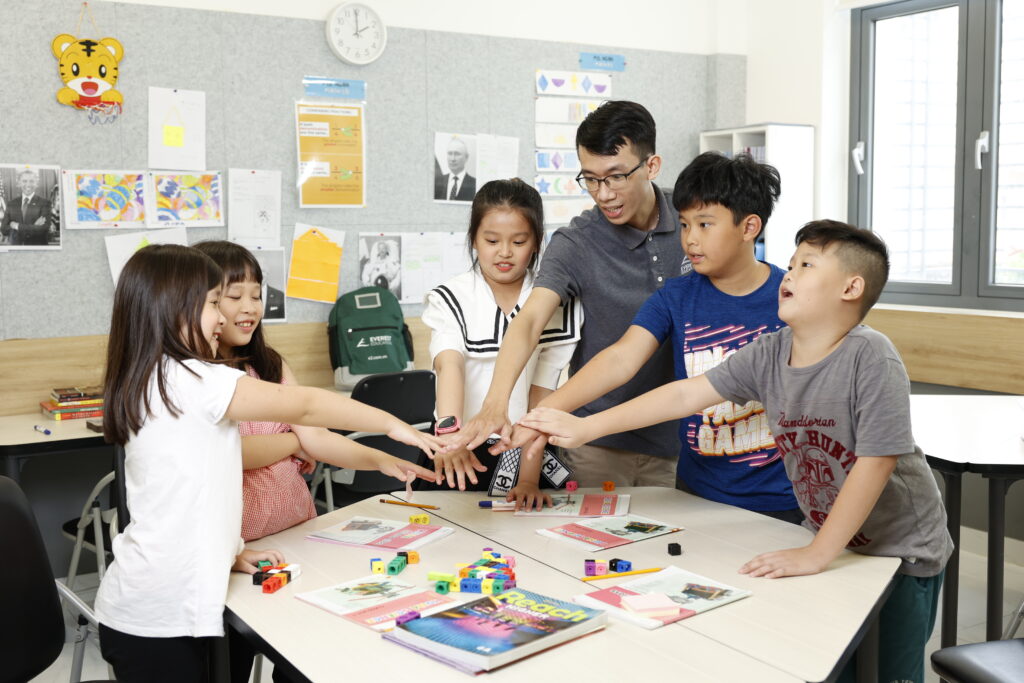
Parting words
During days at the international school, your child might encounter challenges in integrating due to not adapting to the differences in communication culture. Nonetheless, helping your child overcome the language barrier is of paramount importance, in order for them to integrate into the new environment and find increased motivation in their learning journey. If parents are seeking a companion to help children overcome communication obstacles in English at the international school, E2 is a suitable choice. With dedicated teachers boasting years of experience, innovative teaching methods, and engaging extracurricular activities, E2 will provide the means for students to excel in their English skills, ensuring their solid development in the international environment.
Source:
ESL, EFL and ELA when teaching English. | Miss E Classroom
Where learning meets joy
with friends and teachers who care








